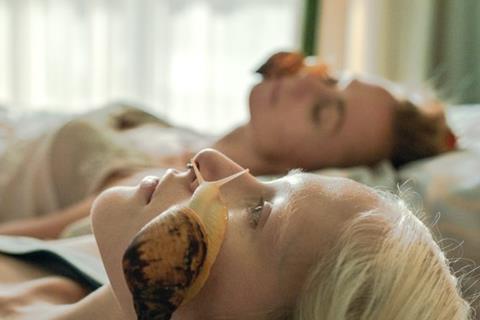Filmmakers Elsa Kremser and Levin Peter work with non-professional cast in a story about a model and a morgue worker

Dirs/scr: Elsa Kremser, Levin Peter. Austria/Germany. 2025. 115mins.
Fiction threads delicate tendrils through real biographies in Elsa Kremser and Levin Peter’s debut narrative feature about two Belarusian lonely souls who forge a tentative relationship. The writer/directors have a documentary background, making Space Dogs (2019) then expanding into more experimental territory with Dreaming Dogs last year. In White Snail the pair take the Ken Loach approach to extremes, working for years with their two main non-professional cast members separately — both of whom are making their film debuts — before bringing them together only on the first day of shooting. Painter Mikhail Senkov spent two decades as a morgue worker like his character Misha, and Marya Imbro roots her character of Masha in her own experience as a model.
Benefits from an unpredictable narrative arc and moody visual aesthetic
Whether all that was strictly necessary is debatable, but the resultant performances come complete with a ring of truth. The unusual development process should alone generate enough curiosity to help White Snail make its way around the festival circuit, and it’s off to a strong start, playing in Sarajevo shortly after its world premiere in competition in Locarno. The film has secured distribution in Austria and Germany, and niche distributors elsewhere could well follow suit.
Although Misha and Masha share similarly reserved personalities, Kremser and Peter’s drama draws on the contrast between what lies inside and the external facade, also offering a dissection of the lengths humans will go to make both the living and the dead look perfect. While the pacing mirrors that of the titular snail in places, it benefits from an unpredictable narrative arc and moody visual aesthetic.
Masha’s appearance suggests an otherworldly fragility. She’s slender with ash blonde hair and pale skin, and her mental state is just as precarious as we meet her sitting calmly with a plastic bag over her head, waiting for the end to come. Hospital arrives instead and it’s there, as she films with her camera through the window, that she first spots morgue worker Misha. Masha’s world could scarcely be more different from his, as she spends her days at modelling school and self-taping auditions for jobs in China — a destination offering a potential safe haven as details of tensions around Belarus’ borders leak in via overheard news reports.
A fascination with death leads Masha back to the morgue on a pretext, and she and Misha strike up a hesitant friendship. Much of this early bonding occurs in nighttime Minsk, with Mikhail Khursevich’s camera capturing the inky blues of the sky broken by the warm pools from the street lights. When Masha is away from Misha at night, a stronger palette is evoked with more neon hues of pink and blue that make her seem almost alien, as well as alienated.
While the model doesn’t even want a smile to mar her look, Misha has turned his skin into a canvas of sorts, covered with tattoos. The house he shares with his mother is also crammed with the outsider art he has created (visceral and painted by Senkov himself). It indicates a preoccupation with death that equals that of Masha’s — although he externalises his consideration of it while she internalises hers. Misha takes Masha’s morbid tendencies in his stride, answering her questions about autopsies — which, the squeamish should note, do not spare the particulars — in matter-of-fact detail. Even as the characters’ bond increases, Kremser and Peter maintain an air of nervous anxiety, with John Gurtler and Jan Miserre’s score reinforcing the mood.
As the action moves out of the city, the directors explore the subtle space that exists between fragility and allowing yourself to be vulnerable. Masha is used to being looked at, but being truly seen by Misha presents an unexpected challenge.
Production companies: Panama Film, RAUMZEITFILM Produktion
International sales: Intramovies, sales@intramovies.com
Producers: Lixi Frank, David Bohun, Elsa Kremser, Levin Peter
Cinematography: Mikhail Khursevich
Editing: Stephan Bechinger
Music: John Gurtler, Jan Miserre
Main cast: Marya Imbro, Mikhail Senkov, Andrei Sauchanka, Olga Reptuh















![[L-R]: Amanda Villavieja, Laia Casanovas, Yasmina Praderas](https://d1nslcd7m2225b.cloudfront.net/Pictures/274x183/6/4/1/1471641_pxl_20251224_103354743_618426_crop.jpg)








